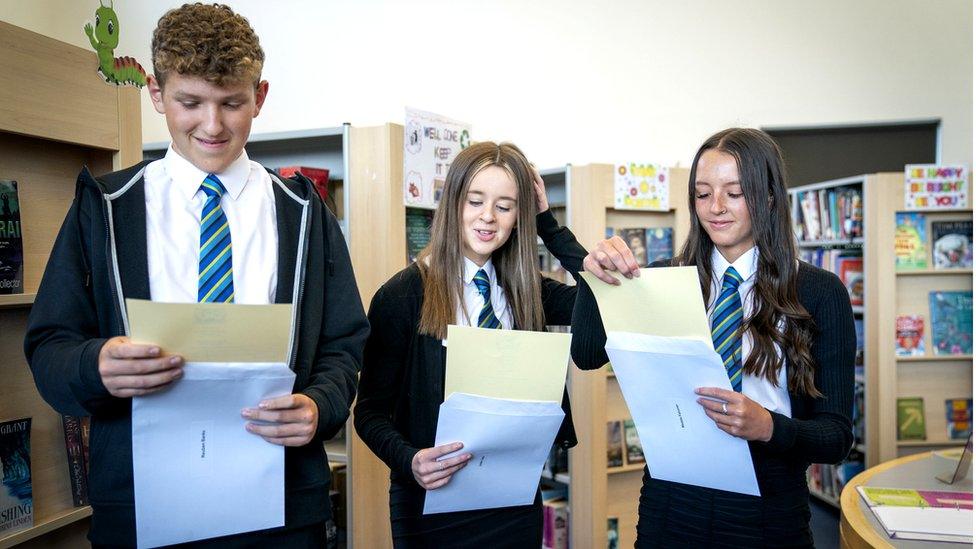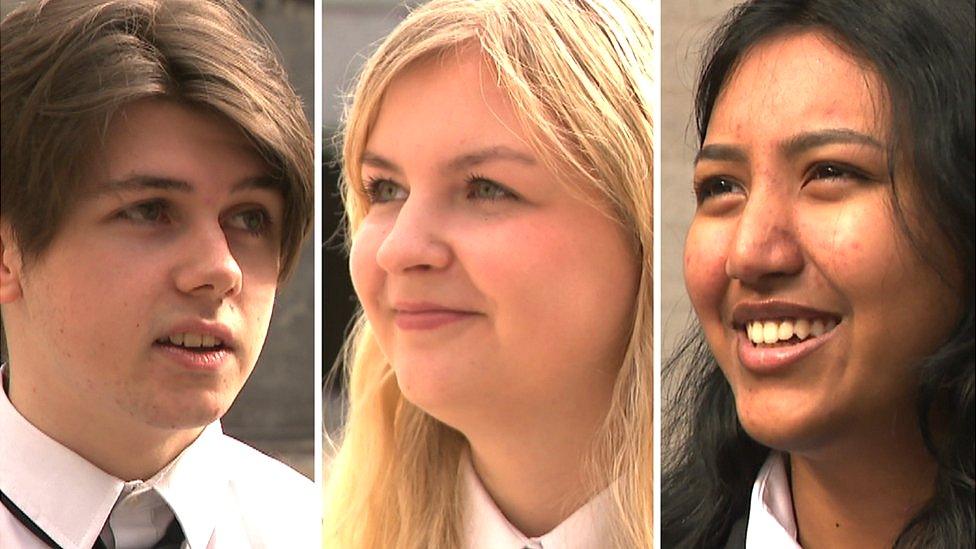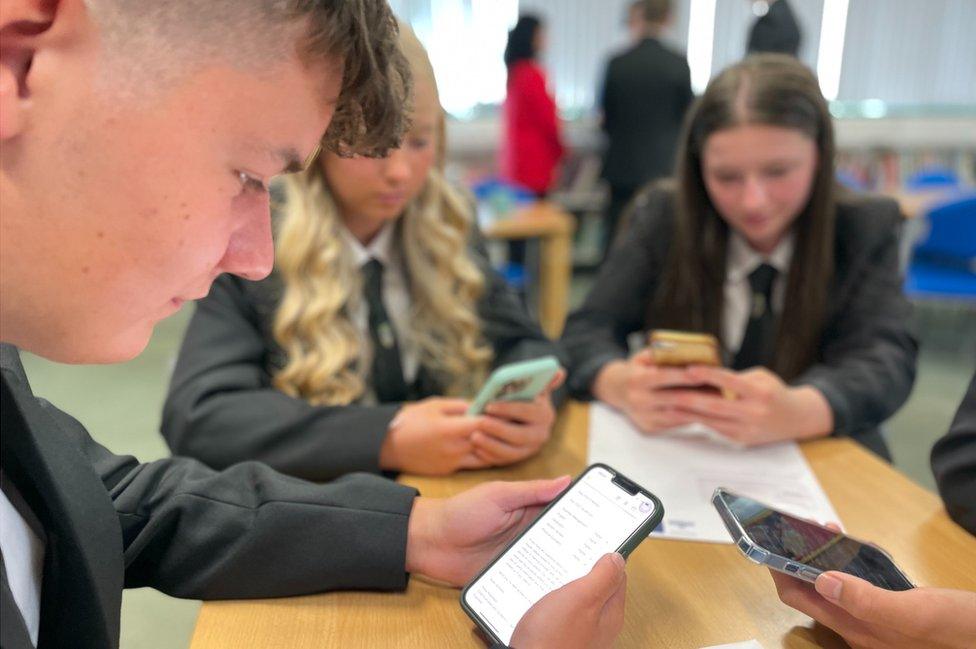Scottish exam pass rate drops from pandemic high
- Published
- comments

Pupils at Lochgelly High School in Fife get their results
The pass rate for pupils sitting exams in Scotland has dropped from the levels seen in the two years when they were affected by Covid pandemic measures.
At Higher level, the number of pupils getting an A to C pass was 78.9%, down from 87.3% last year.
This was higher than the rate of 74.8% in 2019, the last year in which formal exams were sat across the country.
The pass rates for National 5 and Advanced Highers followed a similar pattern.
About 138,000 students from 500 schools, colleges and training centres have been finding out how they did in their qualifications.
The results lie between the record-high grades of the past two years and pre-Covid pass rates.
Students have been given extra support, with a "generous" approach taken to grading due to ongoing disruption.
The Scottish Qualifications Authority (SQA) said this would make it difficult to draw comparisons between attainment over recent years, but said universities and employers could still have confidence that standards had been maintained.
Exams were cancelled two years running during the Covid-19 pandemic, and there was controversy over how results were determined via teacher estimates and coursework.
The results in 2020 saw the pass rate for Highers jump from 75% to 89%, while the percentage of pupils achieving As hit a record high the following year.

This year's statistics, published on Tuesday morning, showed that 80.8% of National 5 candidates were awarded A to C grades, down from 85.8% in 2021, but up from 78.2% in 2019.
In Advanced Higher, A to C attainment was 33.7%, down from 51% last year and up on 31.8% in 2019.
In a normal year, the pass rate for each grade is adjusted slightly but the average effect is very small.
The SQA said that tweaks this year were more "significant", with the median adjustment for a pass at grade C being four percentage points lower than usual. At grade A the median pass rate was two percentage points lower.
Meanwhile, the gap between attainment levels in the least and most deprived areas narrowed from the 2019 level, but has fallen from last year's figures:
National 5s fell from 17.1% in 2019 to 9.1% last year, but rose again to 14.6% this year
Highers fell from 16.9% in 2019 to 7.8% last year, and rose to 15% this year
Advanced Highers fell from 13.6% in 2019 to 6.6% last year, and now stand at 13.2%.
Education Secretary Shirley-Anne Somerville called it one of the strongest-ever sets of results for any exam year.
She said that was "particularly impressive" given the significant challenges learners faced as a result of the pandemic.

Reuben Banks, Jodie Lister and Maddie Falconer open their results envelopes at Auchmuty High School in Glenrothes, Fife
"Pass rates for National 5s, Highers and Advanced Highers have increased compared with 2019, with A passes also up, and skills-based qualifications are close to the highest ever figure," she said.
"It is important to note, though, that although 2022 saw a return to exams, it was not a return to normality.
"The approach to exams reflected the disruption to teaching and learning that young people faced and a wide-ranging package of support and modifications was put in place."
Ms Somerville said she was confident that a "credible, consistent and fair" set of results had been delivered.

'I had never sat an exam before'

David, Leonie and Yana from Oldmachar Academy got their results today
Leonie Nicholl from Oldmachar Academy in Aberdeen got two As and a B, which will allow her do a law degree at Aberdeen University.
But the 18-year-old said sitting her first exams in sixth year was much harder than she expected.
"It's a lot to know your results are riding on one exam rather than a combination of coursework, but it was a good learning experience for uni," she said.
David Greig, who is 18, got three Bs and an A, including two Advanced Highers. He needed results for a conditional offer to study medicine at Edinburgh University.
"I got them by text and was nervous waiting," he said.
"It was stressful because I had never sat an exam before. I enjoyed the teacher-led assessments more, as you could work on that throughout the year."
Yana Mahmoud, 16, is a pupil at the same school - she managed five As in her Highers and will also study medicine.
She said: "It was so nerve wracking, so stressful, with late nights and a bunch of crying. Exams are there for a reason, though."

Ms Somerville also welcomed an increase in skills-based awards which can enable young people to enter apprenticeships or go into the workplace.
And she said that while attainment levels in the least and most deprived areas had narrowed, the pandemic had disproportionately impacted learners from more disadvantaged backgrounds.
She said more would be done to accelerate progress, including £1bn in the Scottish Attainment Challenge during this parliamentary term.
Other political parties praised Scotland's young people, their families and teachers.
But the Scottish Conservatives accused the SNP of "betraying" Scotland's poorest pupils.

Pupils at Currie Community High School in Edinburgh receive their results
Education spokesman Oliver Mundell said the widening attainment gap was a "badge of shame" for the first minister.
Scottish Labour said pupils' achievements were masking system-wide problems and a "loss of learning and knowledge across Scotland's education system".
The Lib Dems said students deserved more from their Scottish government than "desperate spinning about the closure of the poverty related attainment gap".
And the Scottish Greens said fundamental change was required and that high-stakes end-of-term exams were a poor way of judging a young person's attainment.
The Universities and Colleges Admissions Service (Ucas) said a record 60.1% of Scottish students had gained a place at their first-choice university, up from the pre-pandemic level of 57.5% in 2019.
It says this figure will rise as more confirmation decisions are made over the coming days.


The whole point of exams is to produce a fairly standardised measure of a pupil's academic achievement.
How does that work, though, when students face massively different circumstances from previous years - like a global pandemic barring them from even sitting in an exam hall?
This is at the heart of the delicate balance the SQA is trying to strike.
Ministers and officials alike insist that the record results produced in the past two years are just as credible as those of previous generations.
But there has been a conscious effort this year to nudge them more into line with pre-pandemic levels as things get "back to normal".
The challenge is in doing this in a way which is fair to pupils now as well as those from previous years, and indeed the employers and further education institutions which rely on the results.
It also makes if difficult to compare grades year-on-year, which on a national level is important in tracking things like the poverty-related attainment gap.
And the re-adjustment is made all the more awkward by the fact it's being run by the SQA - which is in the process of being broken up and replaced.

Where can I get help?
SQA's Appeals 2022 service, external is free of charge and open from 09:00 on results day.
If learners have a query about their certificate, they can call SQA's Candidate Advice Line on 0345 279 1000.
Skills Development Scotland's results helpline is 0808 100 8000.
Ucas clearing resources can be found here, external or by calling 0371 468 0468.
